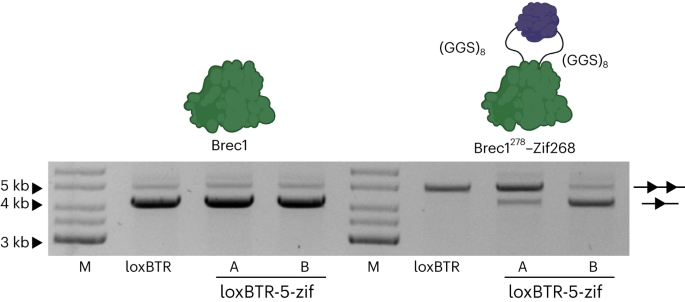- Research Briefing
- Published:
(2024)Cite this article
Subjects
By applying the logic of conditional enzymes, we have developed a zinc-finger-dependent recombinase system, the editing activity of which is induced by zinc finger DNA binding. The system combines the precision of recombinases with the DNA target site programmability of zinc finger domains.
This is a preview of subscription content, access via your institution
Access options
Access Nature and 54 other Nature Portfolio journals
Get Nature+, our best-value online-access subscription
$29.99 / 30 days
cancel any time
Subscribe to this journal
Receive 12 print issues and online access
$209.00 per year
only $17.42 per issue
Rent or buy this article
Prices vary by article type
from$1.95
to$39.95
Prices may be subject to local taxes which are calculated during checkout

References
-
Khalil, A. M. The genome editing revolution: review. J. Genet. Eng. Biotechnol. 18, 68 (2020). This review summarizes the arsenal of programmable nucleases available for genome editing.
-
Papathanasiou, S. et al. Whole chromosome loss and genomic instability in mouse embryos after CRISPR-Cas9 genome editing. Nat. Commun. 12, 5855 (2021). This manuscript exemplifies adverse events that can occur when employing programmable nucleases for genome editing.
-
Meinke, G., Bohm, A., Hauber, J., Pisabarro, M. T. & Buchholz, F. Cre recombinase and other tyrosine recombinases. Chem. Rev. 116, 12785–12820 (2016). This review explains the molecular mechanism of tyrosine-type recombinases and describes their applied properties.
-
Buchholz, F. & Stewart, A. F. Alteration of Cre recombinase site specificity by substrate-linked protein evolution. Nat. Biotechnol. 19, 1047–1052 (2001). This paper describes recombinases with altered target site specificity generated by directed molecular evolution.
-
Lansing, F. et al. Correction of a factor VIII genomic inversion with designer-recombinases. Nat. Commun. 13, 422 (2022). This paper describes the initial generation and properties of the designer recombinase RecF8, which can seamlessly correct a genomic inversion causing hemophilia A.
Additional information
Publisher’s note Springer Nature remains neutral with regard to jurisdictional claims in published maps and institutional affiliations.
This is a summary of: Mukhametzyanova, L. et al. Activation of recombinases at specific DNA loci by zinc-finger domain insertions. Nat. Biotechnol. https://doi.org/10.1038/s41587-023-02121-y (2024).
Rights and permissions
About this article
Cite this article
A conditional, zinc-finger-dependent recombinase system for DNA editing.
Nat Biotechnol (2024). https://doi.org/10.1038/s41587-023-02122-x
-
Published:
-
DOI: https://doi.org/10.1038/s41587-023-02122-x





